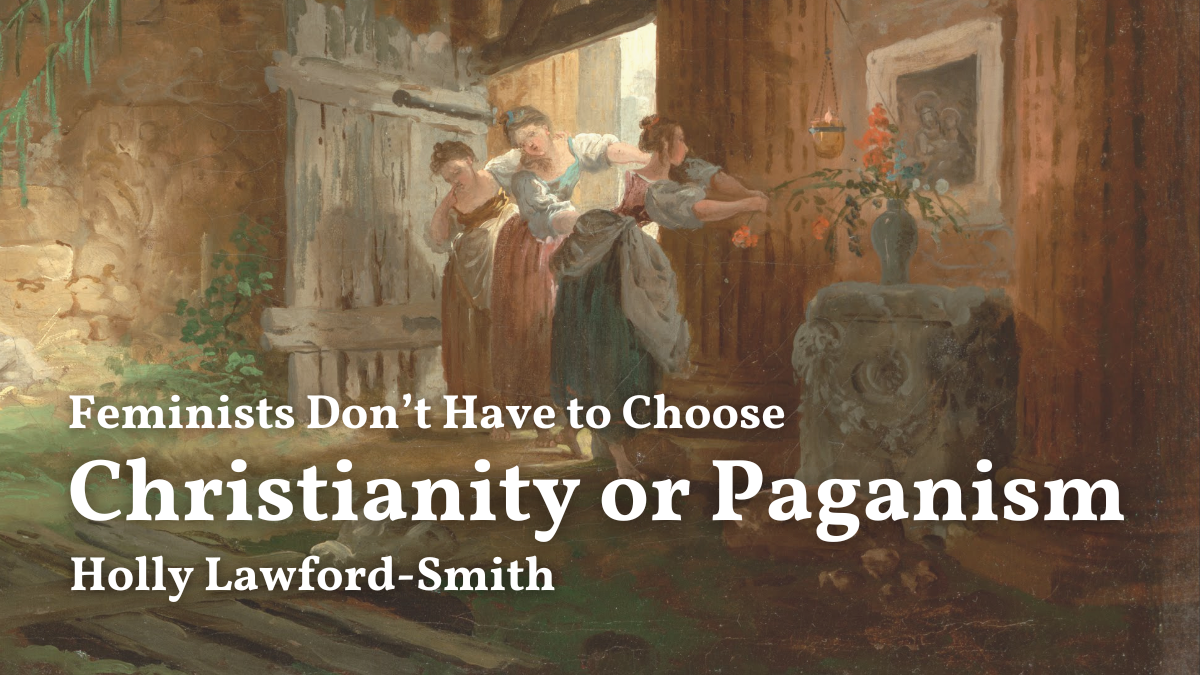This essay is part of a symposium, “Are We Repaganizing?” See the whole collection here.
Louise Perry’s provocative article “We Are Repaganizing” will be of considerable interest to anyone who thinks of Christianity as anti-feminist. Perry makes the case that, considered against the backdrop of what it displaced historically, namely Roman paganism, Christianity improved women’s situation by reconceptualizing rape as a wrong done to women (rather than done to the male kin of high-status women only), and by valorising weakness in a way that worked to women’s benefit as the physically weaker sex. Perry’s view of the relation between feminism and Christianity is neatly summed up in her declaration “Feminism is not opposed to Christianity: It is its descendant.”
Perry takes Christianity as a comprehensive moral system, and she worries that feminists cannot pick and choose between its elements. Following another author, she offers the metaphor of the distinct elements of the Christian moral system as being like beads on a necklace: one cannot pick up a single bead without lifting the entire necklace. The idea seems to be that if we want to incorporate Christianity’s displacement of esteem from the strong (powerful, wealthy) onto the weak, the price we must pay is acceptance of the rest of Christianity. Indeed, Perry describes secular humanism as “just Christianity with nothing upstairs”—meaning, it has taken the moral elements but stripped out the metaphysical commitments.
The implications for feminists of taking the necklace metaphor seriously are that the very reversal of status/esteem that protects them—the valorisation of the weak—also generalizes to foetuses, “who are weaker still.” Perry writes, “Whether we like it or not, we cannot place the protection of the vulnerable at the heart of our ethical system without reaching the conclusion that the unborn child ought not to be killed.” If we must either accept or reject the Christian moral system wholesale, then by advocating for abortion rights—as most mainstream feminism does—feminist are “busy sawing at the branch on which they sit.”
The claim that “we are repaganizing” expresses the worry that feminists will choose abortion rights over the generalized commitment to protection of the vulnerable, and that will mean a return to paganism.
I’m not sure why we should accept the necklace metaphor; whether paganism in some form would really be such a bad alternative; and why feminists can’t hope for better than either Christianity or paganism. I’ll take these three points in turn.
First, it may be that at the time Christianity emerged, acceptance was all or nothing, because it had to appear as a unified system of ideas in order to appeal to people—to offer them an improvement on what they already had. But our understanding of the world has changed immensely in the last two thousand years, including our knowledge of science and our reflections on the nature of morality. There is no reason why we can’t today pick and choose which elements of historical systems of ideas we want to keep and which we want to discard. There is thus no reason at all to think that feminists must decide between either being raped with impunity but being able to have abortions, or not being raped but having to carry foetuses to term. More generally, there is no reason that we must choose between either being protected as the vulnerable at the price of having to protect foetuses by carrying them to term, or being left to the predation or exploitation of the powerful but having abortion rights.
Second, as Mary Harrington argues in Feminism Against Progress, almost all social change involves some good things and some bad things. Perry might be right about the benefits secured by a social shift that stopped admiring the conquerors and started caring for the conquered. Yet it might also be true that the shift away from religions focused on the “immanent”—this earth, rather than an otherworldly afterlife—played a significant role in the disrespect of non-human animals, the environment, and ecosystems that has led to the anthropogenic climate crisis. In another possible world in which the Christians did not defeat the Romans, and we let things run their course to 2023, which of the two worlds—theirs, or ours—would be more desirable? And who is to say that paganism itself would not have developed in a way that eventually opposed social hierarchies?
Third (and finally), it’s worth noting that the valorisation of the weak is not quite the same thing as egalitarianism. We might retrospectively oppose the social hierarchies that resulted from the Roman admiration of the strong (powerful, wealthy), and yet think that merely reversing that social hierarchy to venerate the weak has its problems too. A social change can be an improvement without being the best feasible state of affairs. Contemporary intersectional feminism, for example, attempts to prioritize the worst-off women, but instead of actually doing that (e.g. focusing on sex workers and how to support their exit from the sex industry), it ends up simply creating new social hierarchies in which to have more marginalized identity markers is better.
If feminists truly want real equality for women, a false dichotomy between Christianity and “repaganizing” does not serve them.



